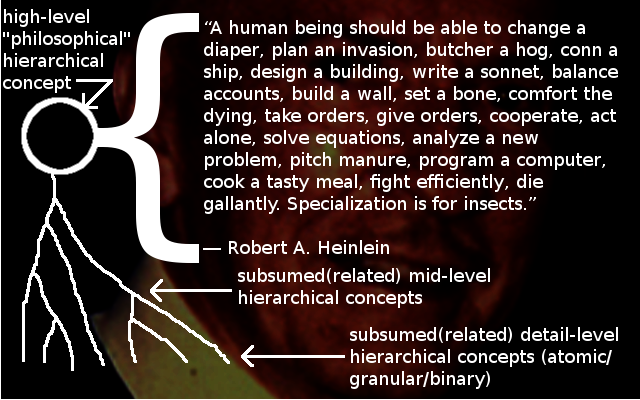Where Did America Go Wrong? Narrow Specialization
Limited High-Hierarchical-Level "Philosophical" Experience; Massive Low-Hierarchical-Level "Detail" Experience
First of all, this writing assumes that most "knowledge that serves human goal structures" is hierarchically-structured. This hierarchical organization makes the knowledge (patterns of stored and compressed data) useful. If you don't believe this already, please read my prior commentary on Ray Kurzweil's conception of hierarchical knowledge (My highest-rated post).
Data need not be organized into a hierarchy, and perhaps patterns other than hierarchical ones are as or more common than linear hierarchies, but given a short lifespan and a survival-and-replication imperative, linear hierarchies are very useful. For example: They let us know when two areas of the same overall pattern are at roughly different priority levels. The human neocortex was, prior to AlphaGo's victory, the best linear pattern recognizer on the planet. (The human neocortex is still the "most prevalent"+"best" but that may soon change, if it hasn't already.)
"General," "high-level," or "system-wide concepts" knowledge about philosophical goals (It's bad to have a central bank; It's important to save for retirement) is often more important than "specific" or "low-level" or "atomic/granular details." (How many people will die because winning a "Go" championship was more important than creating a superior AGI prior to the prison-state doing so? Intelligence is always an arms-race, even if those involved in the arms race don't recognize it as such.)
Humans Regularly Get System-Wide Frameworks Wrong
As Professors Stanley Milgram(Psychology) and R.J. Rummel(Political Science) revealed, humans regularly get social organization wrong. It's one of the most difficult things for most people to "get right," both because they fail to comprehend social structure, or fail to pursue it, if they do comprehend it.
...But try talking to anyone about "Where the political system is taking us" or ask "How can we profit from the few areas of human production likely to outpace central bank inflation?" ...Most people will have nothing intelligent or useful to say, and will, in fact, find an excuse to run away from the discussion. It wasn't always like this in America. "Hierarchical structure" and "logic" were once features of "common sense." This is no longer true, in America. Ironically, it's becoming more true in China (and all across Asia), as those more motivated to success achieve greater heights in cybernetics. All of Asia, for example, paid attention to AlphaGo's victory. China is home to the China Brain Project.
In a Nation that once carried the torch for enlightenment values and individualism, the USA now has a nation of sheep-like submitizens who are "afraid of giving an unqualified opinion on the weather." (To paraphrase Ayn Rand, from "Atlas Shrugged.")
How did things get so bad?
Answer: Elimination of the top-level (AKA: general level, system-wide level, "overall goal" level, etc.) of hierarchical knowledge, via the government-controlled "education"(indoctrination, really) system. The government took over schooling in the 1880s through 1900. (In 1900, Vermont was the final existing state to accept federal control over education, following Horace Mann's "free and compulsory" or "Prussian model." This was likely only because the state was the only State to include school financing in its 1777 founding charter.) Over the next several decades, the government merged "Civics" and "History" into "Social Studies," retaining "History only" as an elective, and then largely eliminating "Civics." Civics was a class that went into detail about when the use of force was proper/moral in society.
If you're a STEM student, and you can help the military build better weapons, or develop tools to help the police track down wanted "felons," then you probably don't have time for in-depth History classes that reveal where and how America went "off the rails." This makes you more likely to uncritically lend your talents to the existing state apparatus. Also, ethics isn't the natural area of talent for STEM students, since numbers come more easily to such students, and human brains have difficulty mastering complex subjects. (It's for this reason that hierarchical frameworks were once encouraged among the student body: teachers once wished to educate students to make them competitive. Since that time, perverse incentives have pushed teachers toward refusing to educate children in areas of general knowledge or civics participation. After all, such participation would give graduating seniors, now able to vote, the ability to fight the property taxes that pay teachers' salaries.)
It's my contention that if we ever want to see benevolent change in our world, we must change this.
The 1950s science-fiction writer Robert Anson Heinlein summed this up, excellently with the following quote:
“A human being should be able to change a diaper, plan an invasion, butcher a hog, conn a ship, design a building, write a sonnet, balance accounts, build a wall, set a bone, comfort the dying, take orders, give orders, cooperate, act alone, solve equations, analyze a new problem, pitch manure, program a computer, cook a tasty meal, fight efficiently, die gallantly. Specialization is for insects.”― Robert A. Heinlein
How best to improve/replace/reconstruct the current system, transitioning it into a proper, legitimate system, is a topic I cover regularly.
...Because it always comes back to jury nullification, here's an interview George Donnelly did with me a few years ago:
The first link referenced in the video, A History of Jury Nullification
http://isil.org/juries-a-history-of-jury-nullification/
The second link referenced in the video, New Hope For Freedom: Fully Informed Juries
http://isil.org/juries-new-hope-for-freedom-fully-informed-juries/
